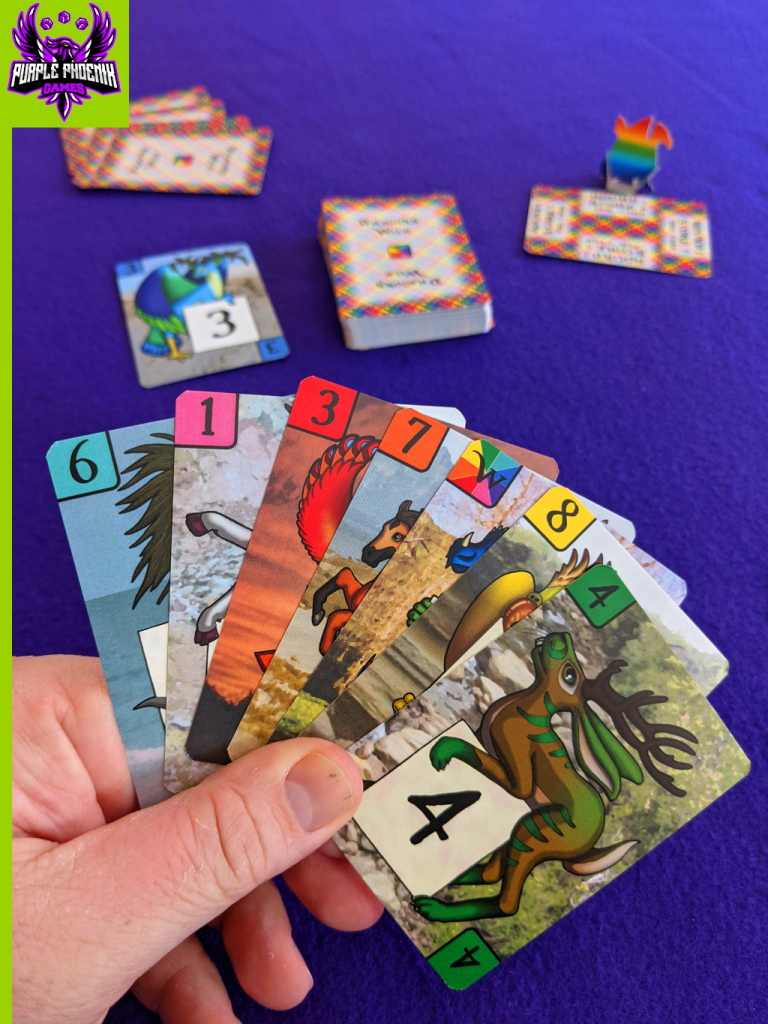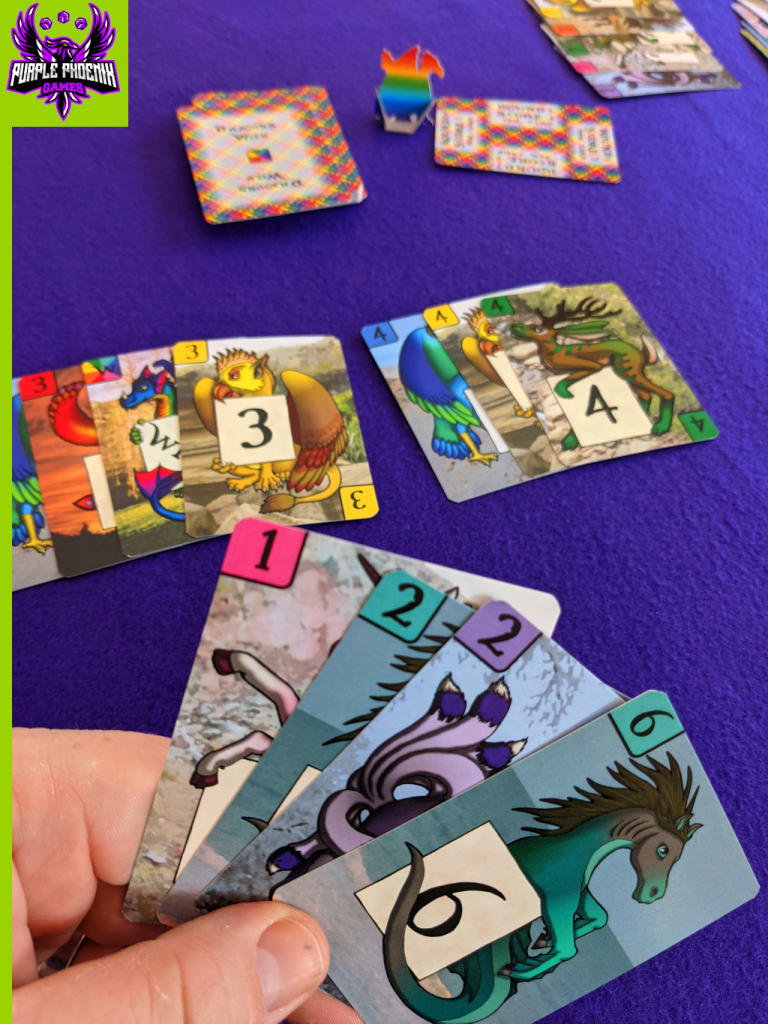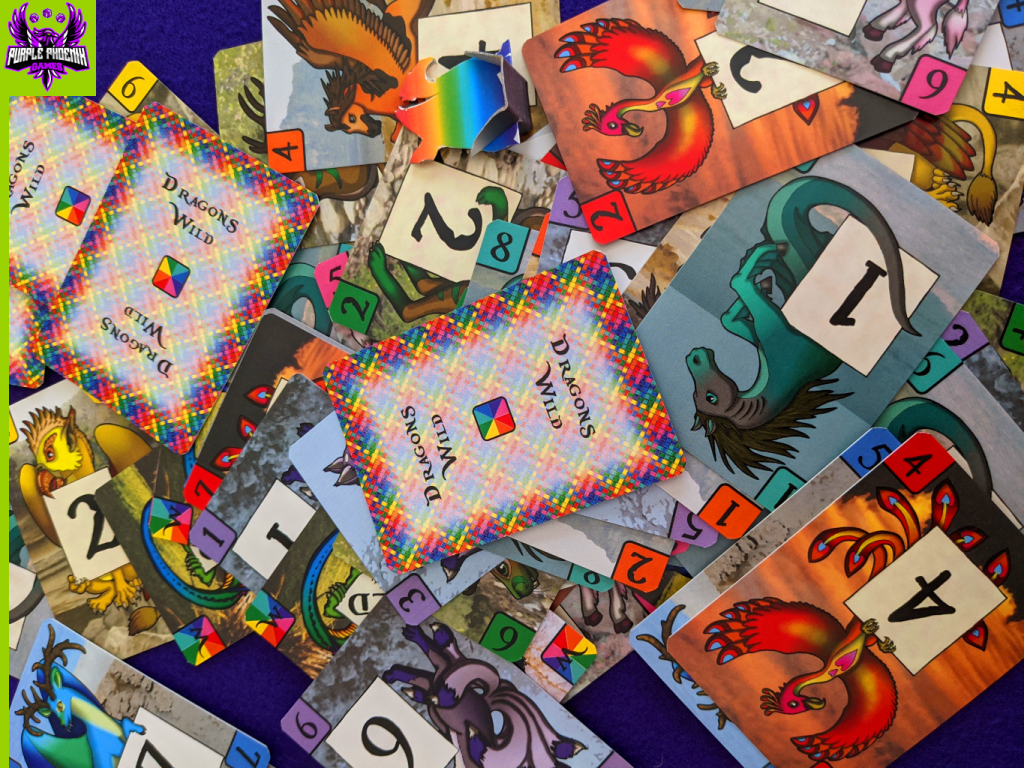
Have you ever had Gamer Deja Vu? Like you know you’ve played this game before but don’t remember, or the mechanics just feel so familiar? I have it seldomly, but I still feel it at times. What I enjoy about certain games is how quick they are teach, have familiar mechanics, but also have their own twists to truly make it unique. Have I found that here with Dragons Wild?
| Dragons Wild (2021) | McKinstry Education Games |
| 2-6 Players | 5-20 minutes |
| Ages 8+ | BGG Weight – (not yet available) |
Dragons Wild is a card game very similar to the old standard, Rummy. So like its predecessor players are trying to rid their hands of cards in order to signal the end of the game. Where this version separates is in the little details that are absent from Rummy.
DISCLAIMER: We were provided a prototype copy of this game for the purposes of this review. These are preview copy components, and I do not know for sure if the final components will be any different from these shown. Also, it is not my intention to detail every rule in the game, as there are just too many. You are invited to download the rulebook, back the game through the Kickstarter campaign launching February 2, 2021, or through any retailers stocking it after fulfillment. -T
To setup choose a dealer and a scorer (different players). The dealer will shuffle the entire deck of cards, save for the scoring cards, and deal each player seven cards. The draw deck is placed in the middle of the table and the dealer flips the top card to create the discard pile. The scorer finds the reference score card and places the dragon token on or near the “Round 1, Score 8 per card” text. The game may now begin!

Generally, the game is played much like Rummy where players are attempting to lay down melds of cards containing either runs (1, 2, 3, 4, etc) or sets (2, 2, 2 of different suits). Once a player has a meld in front of themselves they may play their cards onto other players’ melds. Players must discard a card at the end of each turn, and play continues in this manner until a player runs out of cards.
Dragons Wild, however, adds a few twists to pump up the play of traditional Rummy. Each player will need to keep track of their point totals as they will change with each play of a card. Should a player lay a meld on Round 1 they score eight VP for each card laid. In Round 2 cards are worth seven points each. Round 3 each card is worth six points and so on until Round 8 (or more) where each card is worth just one point.
Another way in which Dragons Wild differs from its older cousin is in the buying of cards (as far as I remember – I’m no Rummy expert). On their turn the active player must draw a card from either the top of the draw deck or the top of the discard pile. However, before the active player chooses, should another player wish to buy the face-up discard card the active player decides to allow or disallow the buy. With a successful buy the buying player takes the discarded card as well as the top card of the draw deck as payment. A player may buy as many as three cards in this fashion for each new active player.
Also, Dragons Wild offers a slight rule change for Wild cards in melds. Every time I have played Rummy in my lifetime any Wild is up for grabs as long as it can be replaced with a legal card from any player’s hand on their turn. This is not the case in Dragons Wild, as only Wild cards that hang on the end of a RUN of cards may be taken, replaced, or moved to the other end by the active player.
The game ends once one player is able to rid their entire hand of cards and still have one card to discard at the end of their turn. Players then total their scores from all cards played, scoring points differently depending on the Round in which they were laid. Other players still possessing cards then subtract the NUMBER of cards still held from their entire score, not their values. The player with the most points after this scoring phase is the winner!

Components. Again, this is a prototype copy of the game, and I am completely unsure which, if any, components will be upgraded as a result of a successful Kickstarter campaign. That said, I can comment on a couple things. First, the art style. While it is not my cup of tea (dragons have tea parties, right?) I can see where others may quite enjoy its fancifulness and whimsy. The game is very colorful, and I do appreciate that quite a lot. The cards are laid out well, and each suit is a different species of fantastic beast (though I rarely knew which was which – I just paid attention to the background color in the corners of the cards mostly). So I have no real problems with the components at all, I just wish for different art. The designer was nice enough to send along a print of a purple phoenix with this copy, which is super rad of her, and it looks great. Maybe she will add them into the final version…
Gameplay is familiar, like I stated earlier, because I would think most people have played Rummy or a variation of it at some point. In fact, my family was big into Rummikub growing up, and my grandparents were big into Rummy proper. So this was somewhat nostalgic for me while also bringing a few house rules and art that is different from a boring deck of normal playing cards.
The rules are not at all difficult, so learning, teaching, and playing have not seemed to be an issue at all here. If players have all played a version of Rummy before then this one will fly pretty quickly. It is a simple, fast, and slightly unique version of Rummy that would be nice to keep around if you need to wait on another player to arrive and they are 10 minutes away, or as a palette cleanser between games. Definitely a filler game, and not at all a bad one!
If you are looking for a differently-themed Rummy replacement with a twist, I recommend checking out Dragons Wild. It’s cute, quick, and has dragons, for Pete’s sake. Consider backing the Kickstarter campaign or asking your LFGS to stock it upon release.

